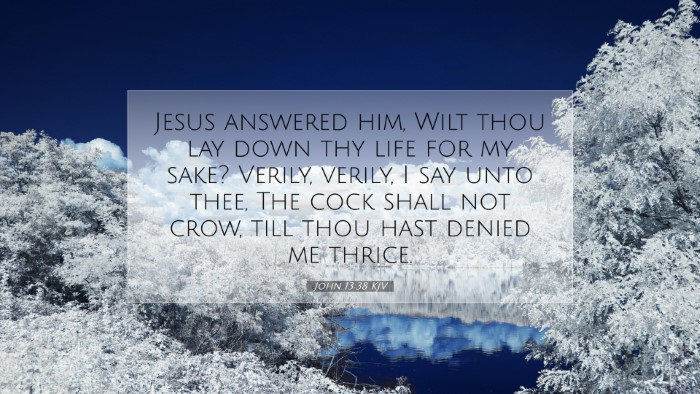Commentary on John 13:38
Bible Verse: “Jesus answered him, 'Will you lay down your life for my sake? Truly, truly, I say to you, the rooster will not crow till you have denied me three times.'” (John 13:38, ESV)
Introduction
The setting of John 13:38 is critical, as it occurs during the Last Supper, just before Jesus’s crucifixion. In this intimate moment, Jesus addresses Peter's bold declaration of loyalty and willingness to lay down his life for the Master. This commentary brings together insights from public domain sources to explore the profound implications of Jesus's statement and what it means for believers today.
Insights from Matthew Henry
Matthew Henry emphasizes the theme of human frailty contrasted with divine foreknowledge. He notes that:
- The Nature of Peter’s Declaration: Peter's assertion highlights the fervor with which he follows Jesus. However, Henry cautions about the impulsiveness of human affections separate from spiritual maturity.
- The Prophecy of Denial: Jesus’s prediction points to the impending weakness of Peter. The reference to the rooster crowing serves as a vivid reminder of the impending trials Peter would face, revealing the depth of temptation and fear that can overtake even the most ardent believer.
Henry concludes that Christ’s foreknowledge serves both as a warning and a means of grace, designed to humble Peter and all disciples who are confident in their strength apart from grace.
Insights from Albert Barnes
Albert Barnes provides a critical perspective on the psychological dynamics within Peter’s character. He comments on:
- Peter’s Leadership Role: As a prominent disciple, Peter’s journey reflects not just personal struggle but also the collective experience of the early church facing persecution and denial.
- The Symbolism of the Rooster: The rooster’s crowing acts as a sign—first of Peter's failure and later of his restoration. Barnes notes this as a poignant metaphor for the moral failings that ensnare believers despite their best intentions.
- The Importance of Humility: This verse teaches that absolute confidence in one’s faith should be tempered with humility and awareness of one’s propensity for failure.
Barnes emphasizes that while believers may falter, there exists a path to restoration, following Christ’s gracious invitation to repentance and renewal.
Insights from Adam Clarke
Adam Clarke offers a detailed exposition on Peter’s denial and its implications:
- The Detail of the Prophecy: Clarke points out the specificity of Jesus’s words regarding the denial. The tripartite nature of the denial mirrors the complexity of human sin, suggesting that even those closest to Christ can yield to fear and doubt.
- Peter’s Zeal vs. His Reality: Clarke discusses the dichotomy between Peter’s zealous intentions and his eventual actions, highlighting the unpredictability of human behavior in the face of adversity. He suggests that this serves as a reminder that zeal must be undergirded by spiritual strength provided by God.
- Applications for Believers: Clarke concludes that this passage serves both as a caution against pride and a source of hope. Believers are reminded that Christ knows our weaknesses and prepares a way for restoration.
Theological Implications
This interplay of loyalty, denial, and grace underscores several theological implications central to the Christian faith:
- The Reality of Human Weakness: The scripture illustrates the stark reality of human fallibility even in those chosen to lead. It affirms that all believers are prone to fail without God’s sustaining grace.
- The Predictive Nature of Jesus’ Words: Jesus’s ability to forecast Peter’s denial showcases His divine nature, reinforcing His sovereignty over all aspects of life, including our trials and failures.
- The Path to Restoration: The narrative prepares the way for Peter’s future redemption and leadership in the early church, demonstrating that denial does not equate to irrevocable failure in God’s Kingdom.
Practical Applications
For pastors, students, and theologians, John 13:38 invites reflection and action:
- Emphasizing Humility in Leadership: This text serves as a vital reminder to leaders to maintain humility and reliance upon God, recognizing that true strength comes from dependence on His grace.
- Encouragement for the Weak: For those who have faltered in their faith, this passage provides hope that redemption and purpose remain; God’s call can and does extend beyond our failures.
- Teaching on Discipleship: This verse can be used to instruct disciples on the complexities of faith, encouraging honesty and vulnerability in their spiritual journeys.
Conclusion
The exchange between Jesus and Peter in John 13:38 is a profound exploration of loyalty, fallibility, and grace. By examining the insights from respected commentators like Matthew Henry, Albert Barnes, and Adam Clarke, it becomes clear that this scripture serves not only as a historical account but as a timeless truth relevant to believers in every age. As the faithful reflect upon this passage, may they be encouraged to embrace their fragility, lean on God's sustaining grace, and strive toward the hope of restoration through Christ.


